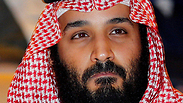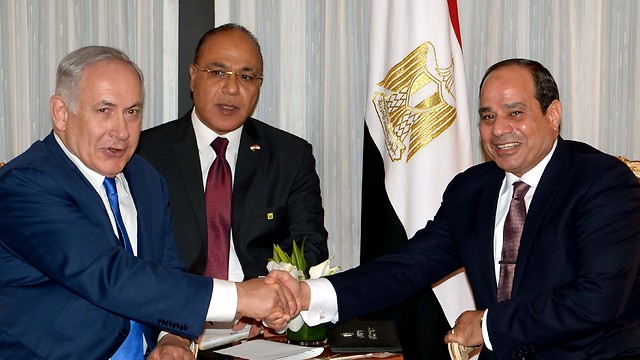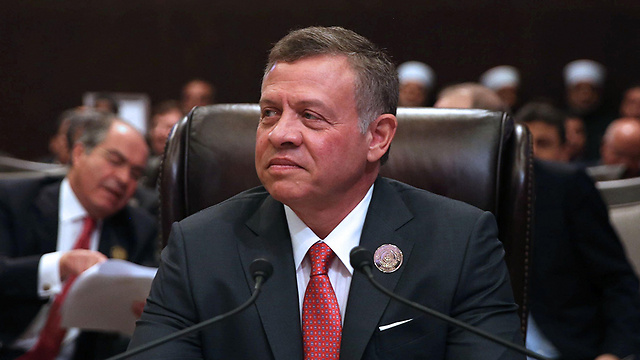
Saudi Crown Prince Mohammad bin Salman
Photo: Reuters

The new peace partners and the next war
Analysis: A new kind of peace is taking shape before our eyes between Israel, Egypt, Jordan and Saudi Arabia. No longer cold, indifferent and hostile, peace is hiding in the highest places of the government echelons. Together, the new peace partners are learning to assess the dimensions of the next conflict, which will likely be the worst we’ve ever experienced.
An old friend called me from Jordan on Monday. Help me out of the imbroglio, he requested. I have an urgent personal issue, and I must get to Tel Aviv. I need no explanation from my friend: the Israeli Embassy in Amman has been under lock and key for four months now, and there is no one to issue him an entry visa and stamp his passport.

Here’s a reminder: King Abdullah is angry with Prime Minister Benjamin Netanyahu for failing to end the security guard affair. The Jordanian street is furious over the unsolved death of two citizens. Israel promised to hand over the investigation report and bring the guard to justice. The king and the street have lost their patience.
A solution has already been found for hundreds of passports that got stranded in the empty embassy building, including passports from Egypt which were sent to Amman after the Israeli Embassy in Cairo was shut down. In Jordan, new documents were issued. In Cairo, anyone wishing to visit Israel is required to first of all present “the yellow note.” The process of obtaining that note, in the general security service’s offices, is deterring. No one wants their name and address to be listed, as someone may pay them a visit at night to inquire why they are rushing to Tel Aviv. No one wants to “get caught in normalization” either.

Prime Minister Benjamin Netanyahu (L) and Egyptian President Abdel Fattah al-Sisi (Photo: Avi Ohayon, GPO)
A new kind of peace is taking shape before our eyes. It’s no longer cold, indifferent and hostile peace, but peace hiding in the highest places of the government echelons. Leader vis-à-vis leader, in Egypt's case, and apparatus vis-à-vis apparatus, in Jordan’s case.
Egyptian President Abdel Fattah al-Sisi announces at his own initiative that he talks to Netanyahu, and the prime minister makes a comment about “an interesting conversation with the Egyptian president.” As for the angry king of Jordan, the street no longer has to launch protests against signs pointing to normal relations. Everything is concealed, and Israel is drifting away.
Now, a third partner is entering the picture. The young crown prince from Saudi Arabia, who is imposing a new political, economic and maybe even social order. As far as he’s concerned, the sky’s the limit. Who should we believe: Energy Minister Yuval Steinitz, who is scattering statements about covert contacts and cooperation, or Saudi Foreign Minister Adel al-Jubeir, who is firmly denying this, and insisting that such things never happened?
I'm going to guess that had there really been no contacts, the Saudi minister would have allowed himself to keep quiet. There are too many signs stacking up on the ground that there is, in fact, a dialogue going on at a high rank. Riyadh and Jerusalem are connected by a whole lot of interests under the rug, led by the Iranian threat. I’m willing to believe the Saudi foreign minister when he insists that we have yet to reach the path of open relations. The test will take place soon: will the Saudis issue entry visas for the Israeli chess team, and how will be greeted, if at all?
The new peace draws the boundaries of the “good guys” camp versus the “bad guys” camp in our neighborhood, between the moderate Sunni-Muslim axis and the evil Shiite axis, as Iran has already succeeded in settling in four capitals: Baghdad, Damascus, Sanaa and Beirut. The Revolutionary Guards are not on an annual field trip; they have come to gain strongholds.
The moderate axis is learning how to walk on eggshells. If a conflict breaks out in one of the places, the next war will be the worst and toughest war we’ve ever experienced, with weapons we never dreamed of, soaked with blood and destruction. It won’t be a war between states. It will be a war within the Muslim camp which everyone is now trying to curb, and Israel—being stuck in the middle—will have trouble evading it.
Together, the new peace partners are learning to assess the dimensions of the next conflict. We should take note of the warnings from one side (Hezbollah Secretary-General Hassan Nasrallah) and the “all clear” signals from our side. No one is planning to initiate an adventure in Lebanon against the Iranians and Hezbollah’s missile arsenal. No one in Riyadh, Cairo and Amman will assume responsibility for taking the first step against Iran, when no one knows where and how it will end. And peace? It will remain in its new, covert place, moving away from the civil level, because the leaders are busy.
















